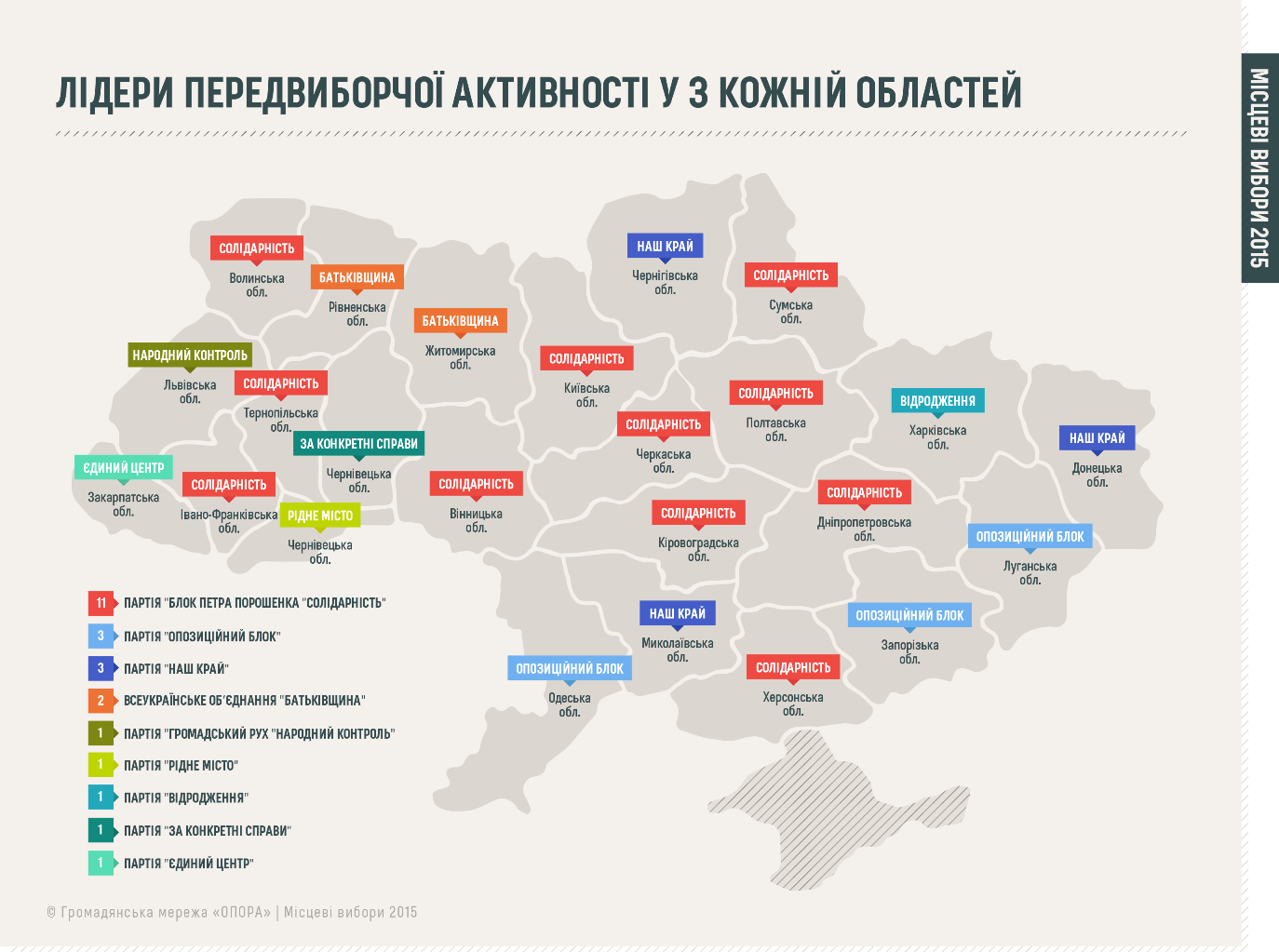Since the beginning of the election campaign, OPORA has detected 668 violations, mostly violation of campaigning rules (380 violations) and voter bribery (193), as of 22 October. Despite there were some cases of administrative resource abuse, it wasn't neither wide scale, nor systematical. Only 12 of 132 political parties participating in local elections organized active campaigning efforts in two and more oblasts. Poorly thought out regulations, lack of uniformity in their application by all election commissions, and decisions of the CEC and courts concerning declarativeness of some regulations of the Law on Local Elections undermines public trust to the state and its ability to efficiently secure high-quality election process.
REPORT. PRELIMINARY OBSERVATION SUMMARY OF 25 OCTOBER 2015 LOCAL ELECTIONS BY OPORA
Olha AIVAZOVSKA, Electoral and Parliamentary Programs Coordinator at the Civil Network OPORA says: “Violations of campaigning rules and indirect bribery of voters are the most widespread as of 22 October. 380 of 668 violations detected by OPORA concerned violation of campaigning rules, and 193 – voter bribery”. According to the expert, campaigning rules were usually violated when production and dissemination of campaign materials was financed not from the election fund. As for the indirect bribery, the most widespread was arrangement of surrounding areas and street infrastructure, construction of playgrounds and sports grounds, distribution of product sets and presents, free medical and legal services. Despite pro-power candidates and parties had both motivation and potential to misuse administrative resources, such violations were rather seldom than systematical (around twenty violations).

Election campaign was quite competitive, there were no unsubstantiated legal restrictions of state interference. According to OPORA's assessment, 12 political parties were actively campaigning in two and more oblasts. Oleksandr Neberykut, Analyst at the Civil Network OPORA, has stated:“These parties are: Petro Poroshenko Bloc 'Solidarity' (24 oblasts), AUU Batkivshchyna (11 of 24), UKROP (11 of 24), Nash Krai (9 of 24), Opposition Bloc (9 of 24), Samopomich Union (8 of 24), Revival party (7 of 24), AUU Svoboda (5 of 24), Radical Party of Oleh Liashko (5 of 24), Agrarian Party of Ukraine (4 of 24), Narodnyi Kontrol (People's Oversight) Civic Movement party (3 of 24) and Ridne Misto party (2 of 24)”. However, there were a lot of local parties which were active only in some territorial communities despite their nationwide status.


Oleksandr Kliuzhev, Analyst at the Civil Network OPORA, has emphasized: “Taking into consideration a previous reporting period, OPORA considers territorial communities of Dnipropetrovsk, Kharkiv, Cherkasy, Odesa, Mariupol, and Krasnoarmiisk (Donetsk obl.) and Lysychansk (Luhansk obl.) as problematic. There are serious problems in these regions in regard to securing effective work of election commissions, their political impartiality, risks of administrative resource abuses on the election day and after election precincts are closed. There are also many incidents related to indirect voter bribery.” The expert has stated that OPORA considers Ternopil and Poltava as potentially problematic cities, due to organizational issues and political factors influencing the production of ballot papers.
It should be mentioned that territorial election commissions in all regions of Ukraine failed to produce ballot papers within time limits established by the Law, as we as other related procedures. Errors and inaccuracies in text of ballot papers resulted in additional expenses on production of new ballots.
As of 22 October, according to OPORA's data, 1581 members of election commissions were substituted in 640 TECs (territorial election commissions), created by the CEC [rotations of oblast, raion, city (cities of oblast significance, Kyiv city), and district in city of Kyiv election commission members]. It's almost 15% of the total number of members in TECs created by the CEC. At the same time, if compared to rotation of district election commission members in 2014 early parliamentary elections in Ukraine (reaching 50%), TECs are quite stably formed. Percentage of rotations in precinct election commissions created by TECs before 9 October 2015 inclusive was quite high. Although there were not wide scale disruptions in PEC functioning, the fact that most of these election commissions have minimal membership can cause organizational issues on the election day.
According to OPORA's estimations, expenses of political parties and candidates on election campaign were quite high as they used the most expensive types of advertising (outdoor and media advertising). As for the drawbacks, there were no wide scale open discussions or debates between candidates dedicated to prospects of local development. Besides that, there were many campaign promises which do not belong to authority of local self-government bodies.